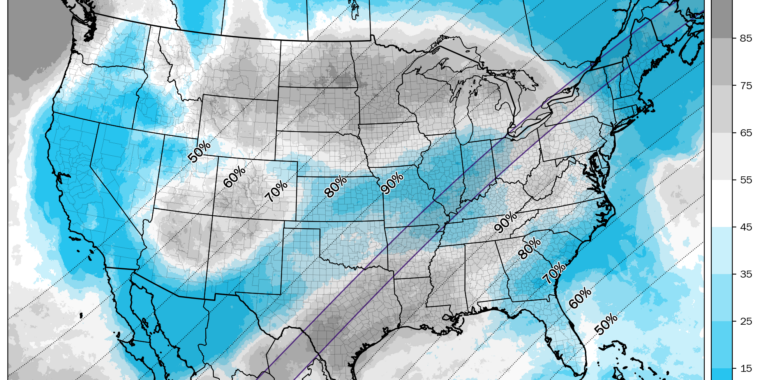Forecasting Cloud Cover for the Upcoming Solar Eclipse
The anticipation for the upcoming total solar eclipse in the United States is high, with many viewers eager to witness this rare phenomenon. However, one crucial factor that can make or break the viewing experience is cloud cover. Clouds are notoriously challenging to forecast due to their localized nature and variability in formation, posing a significant challenge to meteorologists.
Clouds can appear anywhere from a few thousand feet above the ground to 50,000 feet in the atmosphere, requiring detailed atmospheric data from various sources such as ground-based observations, weather balloons, aircraft, and satellites. Despite these efforts, achieving precise cloud forecasts remains a complex task.
The Complexity of Cloud Forecasting
One of the main challenges with cloud forecasting is the unpredictability of partly cloudy skies. Even with a favorable forecast indicating minimal sky cover, a large cloud passing over the sun during the total eclipse can diminish visibility, highlighting the unpredictable nature of cloud movements.
In the lead up to the solar eclipse, meteorologists have been closely monitoring cloud cover predictions to provide viewers with accurate information. The forecast has shown consistent patterns, with regions such as northern New York, Vermont, New Hampshire, and Maine expected to have clear skies due to high-pressure systems in place. Conversely, areas like Texas have faced persistent cloud cover forecasts, posing challenges for potential viewers.
Strategies for Optimal Viewing
For viewers eager to witness the solar eclipse under clear skies, several strategies can help navigate potential cloud cover obstacles. Utilizing online resources to track cloud cover updates and detailed forecasts for specific locations can provide valuable insights into viewing conditions.
One recommended approach is to explore local National Weather Service websites for forecaster discussions regarding cloud cover expectations. Additionally, meteorologist Tomer Burg has developed a comprehensive website offering eclipse overviews and localized forecasts to assist viewers in identifying optimal viewing locations.
Despite varying cloud cover forecasts across different regions, there is hope for viewers even in partly cloudy conditions. With the potential for last-minute changes and breaks in cloud cover, viewers are encouraged to remain optimistic about experiencing this unique astronomical event.
While optimal viewing conditions may not be guaranteed in all regions, the solar eclipse promises to create a special and memorable experience for viewers across the United States.
Image/Photo credit: source url





